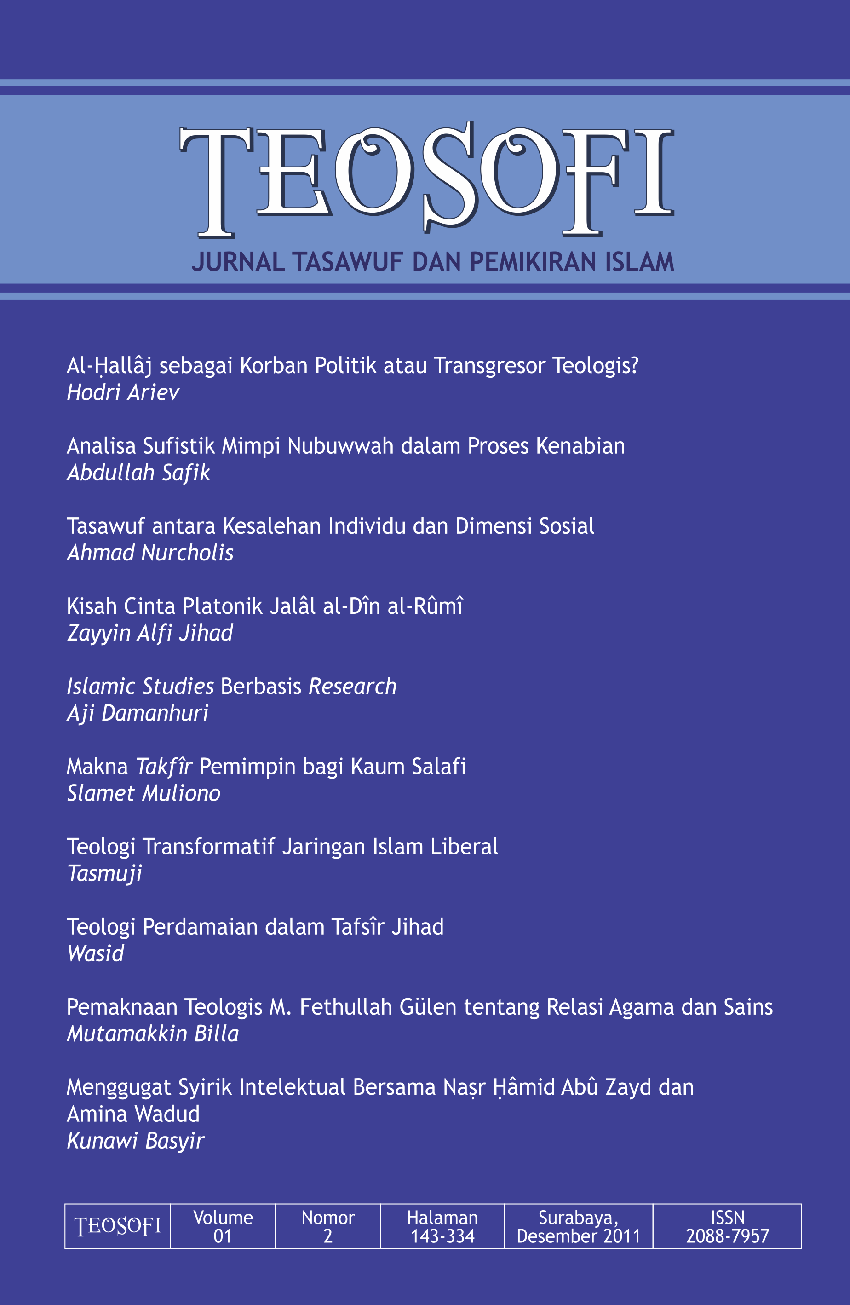Menggugat Syirik Intelektual Bersama Nasr Hâmid Abû Zayd dan Amina Wadud
Main Article Content
Abstract
The article discusses the gender issue, which has still become a global discourse within the 21st century. The discourse will always become an actual issue as it constantly emerges from women and the community’s consciousness who find strategic discrepancy and injustice in regard to the relation between men and women, which might lead to relational discrimination, subordination, stereotype, and inequality. At this point, the writer attempts to bring about the comparative analysis between two interpretation paradigms on gender issues promulgated by Nasr Hâmid Abû Zayd and Amina Wadud. Both people share a common academic apprehension when they observe the backwardness of the Muslim women in many aspects of life (as a fully human agency) caused by patriarchal tradition, gender injustice, and the problem of the minority in the Muslim world. This has subsequently caused the two authors to reconstruct the methodological paradigm of Quranic exegesis on gender issues in order to generate a just interpretation. They see the importance of having high social consciousness, which properly considers women’s existence based on humanity's sacred values. However, this view faces obstacles from other Muslim scholars as they consider Zayd and Wadud heretics and have conducted what so-called “an intellectual shirk”.
Downloads
Article Details

This work is licensed under a Creative Commons Attribution-NonCommercial 4.0 International License.
Licensing
© The Author(s). Published by Department of Aqidah and Islamic Philosophy, Faculty of Ushuluddin and Philosophy, Sunan Ampel State Islamic University Surabaya, Indonesia.
This is an Open Access article distributed under the terms of Attribution-NonCommercial 4.0 International (CC BY-NC 4.0).
References
Eco, Umberto. Teori Semiotika, terj. Inyiak Muzir. Yogyakarta: Kreasi Wacana, 2009.
Engineer, Asghar Ali. Hak-hak Perempuan dalam Islam, terj. Farid Wajidi. Jakarta: LSPPA, 1994.
Faqih, Mansour. Menggeser Konsepsi Gender dan Transformasi Sosial. Jakarta: Pustaka Pelajar, 1996.
Faruk. Pengantar Sosiologi Sastra. Yogyakarta: Pustaka Pelajar, 2003.
Kermani, Navis. “From Revelation to Interpretation: Nasr Hâmid Abû Zayd and The Literary of The Qur’ân” dalam Suha Taji-Farouki, Modern Intelectual and The Qur’an. London: Oxford University Press, 2004.
Kurzman, Charles. Liberal Islam, terj. Bahrul Ulum dan Heri Junaedi. Jakarta: Paramadina, 2001.
Latief, Hilman. Nasr Hamid Abu Zayd: Kritik Teks Keagamaan. Yogyakarta: eLSAQ Press, 2003.
Muhsin, Amina Wadud. Inside Gender Jihad: Women’s Reform in Islam. Oxford: Oneworld Publication, 2006.
-----. Qur’an and Women, Rereading The Sacred Text from a Woman’s Perspective. Oxford: Oxford University Press, 1999.
Rahman, Fazlur. Islam and Modernity: Transformation of on Intellectual Tradition. Chicago: The University of Cichago, 1981.
-----. Islam dan Modernitas, terj. Ahsin Muhammad. Bandung: Bandung Pustaka, 1995.
Ratna, Nyoman Kutha. Paradigma Sosiologi Sastra. Yogyakarta: Pustaka Pelajar, 2003.
Sadli, Saparinah. “Identitas Gender dan Peran Gender”, dalam Omas Ironi, Kajian wanita dalam Pembangunan. Jakarta: Yayasan Obor Indonesia, 1995.
Subhan, Zaitunah. Menggagas Fiqh Pemberdayaan Perempuan. Jakarta: El-Kahfi, 2008.
Umar, Nasaruddin. Argumen Kesetaraan Gender: Perspektif al-Qur’an. Jakarta: Paramadina, 2001.
Wasid dkk, Menafsirkan Tradisi & Modernitas: Ide-ide Pembaharuan Islam. Surabaya: Pustaka Idea, 2011.
Yunus, Mahmud. Tafsir Qur’an Karim. Jakarta: Hidakarya Agung, 1993.
Zayd, Nasr Hâmid Abû. Al-Nass wa al-Sultah wa al-Haqîqah. Beirut: Al-Markaz al-Thaqâfî al-’Arabî, 2000.
-----. Dawâir al-Khawf: Qirâat fî Khitâb al-Mar’ah. Beirut: Al-Markaz al-Thaqâfî al-’Arabî, Cet. II, 2000.
------. Teks Otoritas Kebenaran, terj. Khorion Nahdiyyah. Yogyakarta: LKiS, 2003.

